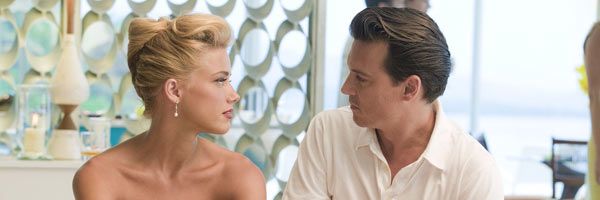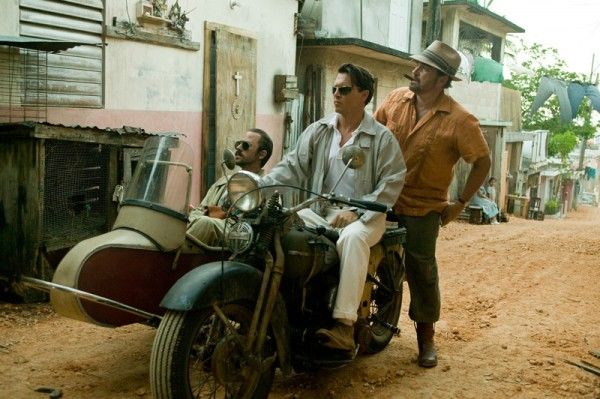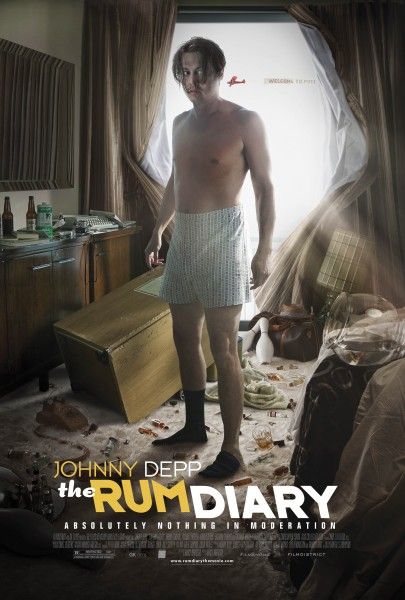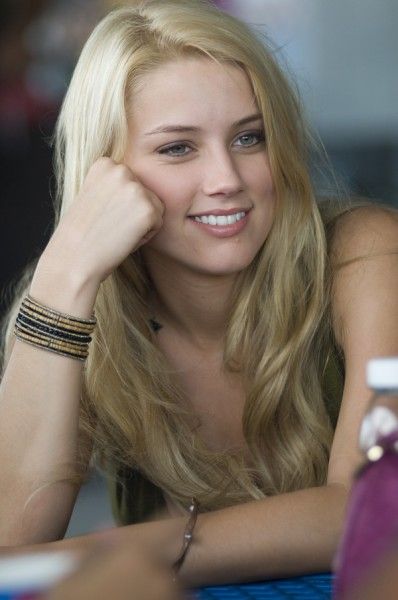In The Rum Diary, adapted from the novel by Hunter S. Thompson, actress Amber Heard plays Chenault, the beautiful Connecticut-born fiancée of a shady businessman named Sanderson (Aaron Eckhart). When journalist Paul Kemp (Johnny Depp) travels to Puerto Rico in 1960, to writer for a local newspaper, he meets and soon becomes obsessed with the sultry temptress, leaving her torn between financial stability and love.
At the film’s press day, Amber Heard spoke to Collider for this exclusive interview about the torturous auditioning process they put her through for the role, why her interest in Hunter S. Thompson’s work was piqued when she was in ninth grade, what a dream it was to work with Johnny Depp, and how the stylized wardrobe really helped her get into character. She also talked about being able to relate to the indignation that can come with the expectations of looking a certain way, her desire to make the sexy girl roles into something more, and how excited she is to promote her next film, Syrup. Check out what she had to say after the jump:
Question: What was this auditioning process like for you?
AMBER HEARD: It’s a prestigious movie and it’s got a great, talented cast, so they wanted to make sure they had the right person for the role, but it was a torturous process. It was painful. I found out that they were making this movie and my heart fluttered. I remember thinking, “Oh, wouldn’t that be amazing,” but didn’t really consider it, in a real way, as a possibility. And then, six months later, I was on set. It was a weird ride.
How did you first become aware of the work of Hunter S. Thompson?
HEARD: Somebody was reading it, when I was in ninth grade, and was bragging about reading about all the debauchery and drug use. My interest was piqued and the rebel in me thought, “Oh, it would be really fun to get my hands on a piece of literature that isn’t coming from the PTA.” I was interested in it. The rebel in me fell in love with it, and the artist in me was confused by it, and interested and turned on. Ever since, his work has meant different things to me, at different times, and I still get new meaning out of it and appreciate it, in a different way. His work is very visceral, and you can take from it what you want, in various moments of your life.
What was it like to collaborate with Johnny Depp?
HEARD: He’s a wonderful artist, and such a talented person. I got along with him, splendidly. He’s charming and wonderful to work with. He’s a dream. It was such a creative environment. I was working with real artists, and that’s difficult to do and very rare, in this industry, ironically.
In playing such a stylized character, was it a collaborative process, in figuring out how she would look and behave?
HEARD: I think so. It was an unspoken, and then spoken, collaboration. We all appreciated a certain aesthetic, and with that appreciation came a certain stylized presence. For me, I wanted to play the archetype of what that leading lady was, with a nod to the ‘50s and ‘60s glamorized, socialite, movie star, housewife in training, or whatever, and she was this member of the elite class that comes from a rich dad and will go to a rich husband and is living this life. And then, she has this horrible fall from grace and falls in love with the opposite of that, and then learns a different way to see life.
Did the wardrobe really help you, in finding this character?
HEARD: I was pretty much the only woman in the movie, so it was important to sell the time period. What makes the stylized nature of the ‘60s so beautiful and specific is really best seen in a woman, not a man. Women’s fashion greater reflects change. That was part of creating the aesthetic that we did. It was fun.
What was it like to work with Aaron Eckhart and play that relationship?
HEARD: Aaron and I, in real life, have a very different relationship. Those things just transfer over, unless you’re actively trying to suppress them. Aaron and I interact with one another very differently than Johnny and I do. People work like that, I guess. Chemistries are different. I have a lot of respect for Aaron and his talent and his complexity. I very much appreciated my Aaron and Johnny sandwich. It was a good team.
How did you see the difference in the relationships that Chenault has with both Sanderson and Paul Kemp?
HEARD: Why I like Chenault is because she serves as a surrogate vehicle for the audience. We take the journey with her. She is very much a commodity of this upper class. She encompasses the American dream. She embodies this ideal that men either want to possess and own, or that women strive to be. It’s an interesting thing to appreciate her in that detached way, but I had to because I know there’s more to her.
As somebody who’s used to being viewed on a certain level, I appreciate that there is some sort of indignation with such assumptions. You get used to those assumptions, and either you rebel against them or you don’t. I am a rebel, and I relate to the rebel spirit in Chenault. She embodies the archetype of a 1950's and 1960's woman, who is a socialite. She is trapped in this glass world, and her fall from grace allows her to fall in love with Paul Kemp and go the opposite way.
Paul Kemp represents one end of the spectrum, and Sanderson represents the other, and they both represent almost the opposite of one another, in the struggle for what the American dream is. Chenault best carries that transition. We see her go from one to the other, and we do that with her.
What’s it like for you to be in this business and go after the roles that you want? Do you have to find a way to use your sexuality when you need to?
HEARD: I would love not to, but the sad thing about our society is that women are put in one of two categories. You’re either in the beautiful category and you’re seen as sexy and beautiful, or some version of that, or you’re put into another category. In those categories, there comes a certain set of obligations, expectations and standards. The former allows you a larger flame, but that flame dies super-quick and you have nowhere to go from there. You have to do something else by 30 years old, if you haven’t found another way to explore your own identity and make something of it. The latter category affords women the opportunity to be smart, funny, independent, mean, strong, intelligent and opinionated. We take them seriously as politicians, if they fit into that latter category. That’s in relative terms – not seriously, relative to a man. We respect their opinions more and give them higher expectations. That latter category is what allows female actors to be characters.
It’s a sad fact of our society that there are no characters that exist in the former. You just play that one role. You play that one note. In the latter category, you are afforded much more opportunity. I would love nothing more to participate in a real struggle to find a character, and really delve into and develop a character. That’s why I’m an actor. And, I will continue to struggle against that standard.
That’s what I reference when I say I’m a rebel. I’m continually fighting against that. I don’t take parts because they’re for the sexy girl. I take the sexy girl parts and try to give them something else and make them a character. I just know that, at some point, you have to choose between the two. We didn’t take Charlize Theron seriously until she did Monster and became physically ugly. I would love to see women be able to be powerful, complex, smart, opinionated and taken seriously, even if they are beautiful. Even more, I would love to see women held to different standards, other than the superficial ones that we’re held to.
Do you have any idea what you’re going to do next?
HEARD: Yeah, I’m going to be promoting my film, Syrup. I play Six, who is a very, very smart, independent, fierce young woman, who is taken very seriously in her world. I am excited about that. And, I am onto the next job. I just came off my show (The Playboy Club), so we’ll see.




